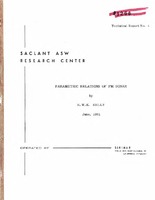| dc.contributor.author | Kelly, H. W. K. | |
| dc.date.accessioned | 2018-10-11T14:06:58Z | |
| dc.date.available | 2018-10-11T14:06:58Z | |
| dc.date.issued | 1961/06 | |
| dc.identifier | 2298 | |
| dc.identifier.govdoc | TR-4 | |
| dc.identifier.uri | http://hdl.handle.net/20.500.12489/314 | |
| dc.description.abstract | The report deals with the simple theory of FM sonar operations and shows how an optimum system may be designed. It also indicates the effects of doppler, the equipment and other factors which may be expected, in practice, to set a limit to the achievable performance. It was shown that an FM sonar system may be designed whose performance against a noise background will be comparable with that of a system using a pure tone pulse of the same length. The optimum parametric relations for this case are derived. The FM system, however, has a range discrimination which may be about one hundred times better than a long pure tone pulse, and the signal-to-reverberation ratio will correspond to this high range discrimination. | |
| dc.format | 22 p. : ill. | |
| dc.language | English | |
| dc.publisher | NATO. SACLANTCEN | |
| dc.relation.ispartofseries | AD0808751 | |
| dc.subject | Parametric sonar | |
| dc.subject | Frequency modulated pulses | |
| dc.subject | Signal processing | |
| dc.subject | Doppler effect | |
| dc.subject | Echo ranging | |
| dc.title | Parametric relations on FM sonar | |
| dc.type | Scientific Technical reports (TR) | |
